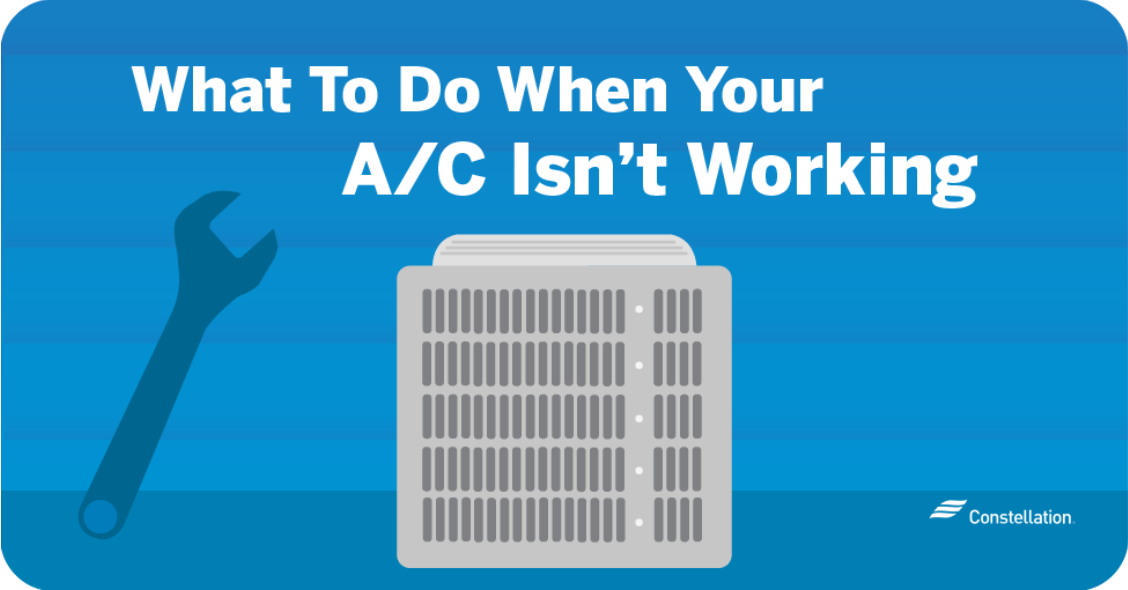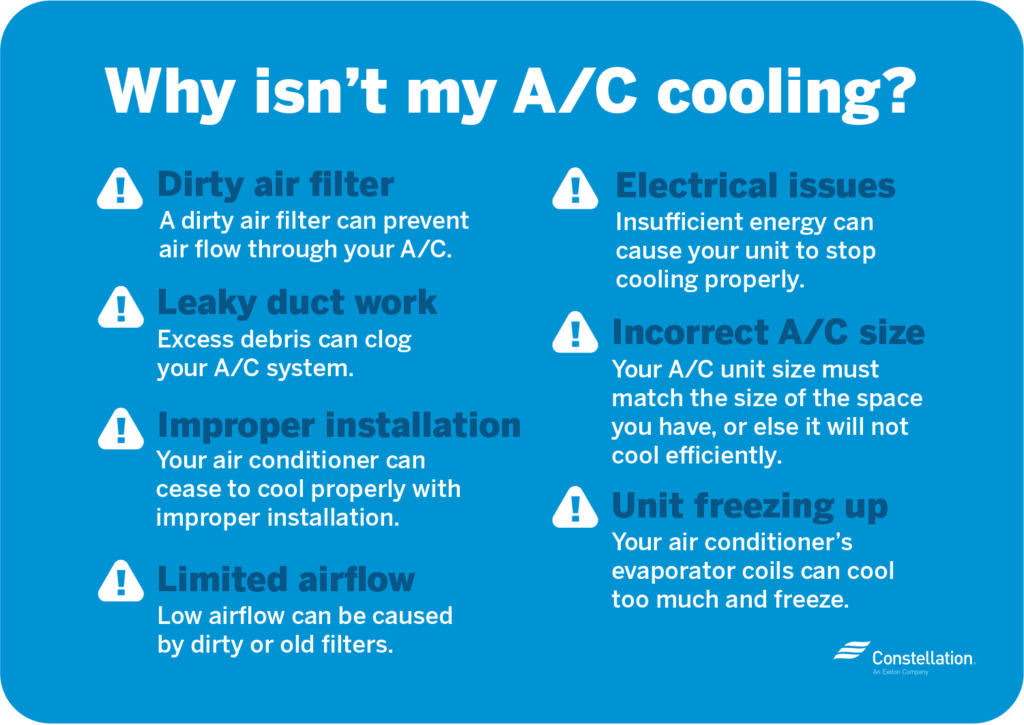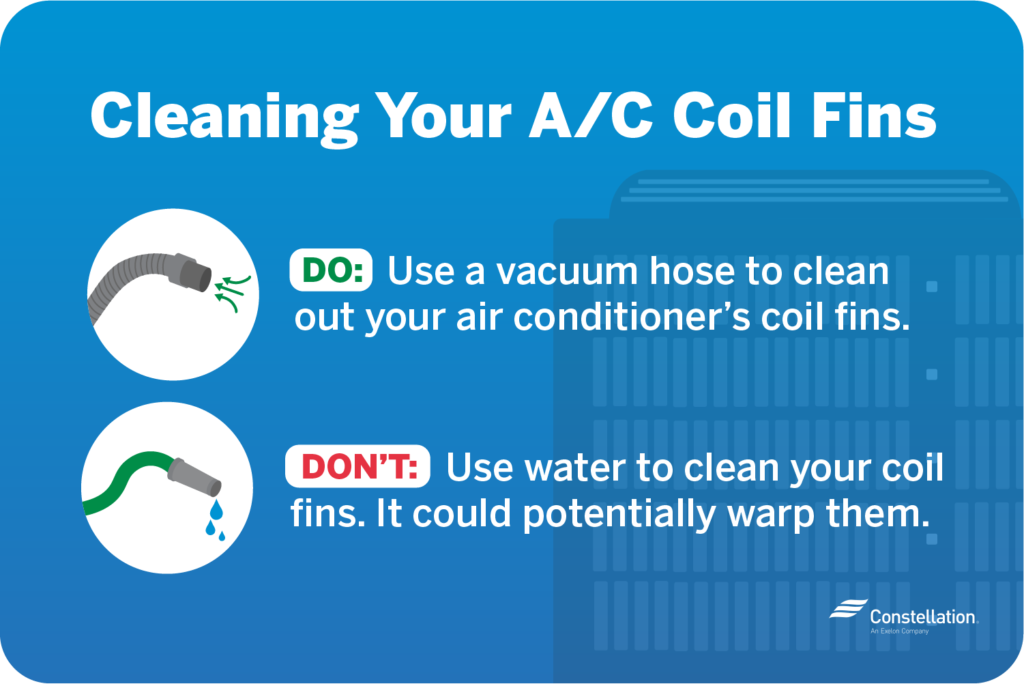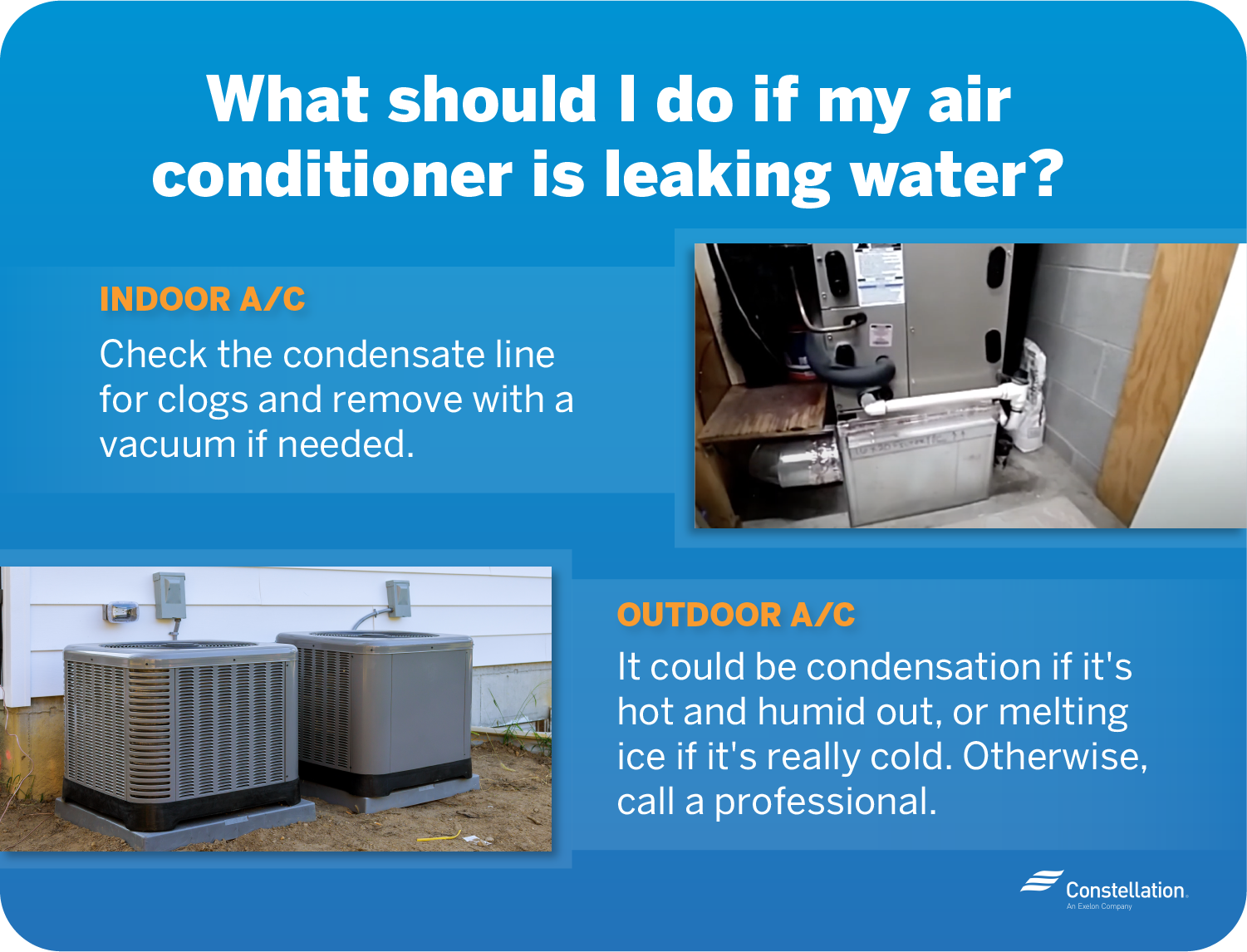
- Category:
Home Energy Savings -
Last updated:
June 14, 2024
A/C Not Cooling? 7 DIY Tips to Fix Your A/C
When the temperature starts to climb, most people rely on their air conditioning system to keep their home cool and comfortable. So, when your air conditioner stops working correctly, you’re bound to notice the problem right away. And you’re going to want to get it resolved just as quickly.
There are many common issues that can cause your air conditioner to work harder. What’s more, A/C units that work harder often consume more energy. Fortunately, air conditioner problems are often easy to diagnose and quick to fix, especially with the help of a professional.
The most common A/C problems and how to fix them
- Air conditioner running but not lowering temperature
- A/C not cooling your house enough
- Air conditioner won’t turn on
- Air conditioner won’t stop running
- Air conditioner leaking water
- A/C indoor fan not working
- A/C outdoor fan not working
What if you can’t fix your A/C?
Preventing damage with routine A/C maintenance
How to clean your air conditioner
When to hire a professional to fix your air conditioner
The most common A/C problems and how to fix them
Whether it’s dirty filters, improper installation, or an incorrectly sized unit, there are a number of reasons your central air conditioner may stop cooling your house — or stop working altogether. Here are some of the more common issues you’re likely to run into with your air conditioner, along with tips on how to get them resolved as quickly and efficiently as possible.

1. Air conditioner running but not lowering temperature
There are a few things you’ll want to check if your central A/C is running but not blowing cold air, beginning with your thermostat. Start by making sure you have it set to your desired temperature and that it’s switched to the “cool” setting. Next, double-check your vents to ensure they’re open and free from obstructions.
If that doesn’t work, remove your A/C filter, and inspect it for any dust or discoloration. You can try cleaning the filter if it’s dirty, but you may have to purchase a new one for your system to work properly. You should also check your outdoor A/C unit to make sure there’s no vegetation or other obstructions blocking the system. If you’re still having problems, consider contacting an HVAC professional for more assistance.
You can also reference this video for a step-by-step walk-through from a Constellation home services technician on what to do when your central A/C won’t blow cold air:
2. A/C not cooling your house enough
If your air conditioner isn’t cooling your entire house, or isn’t cooling your house enough, start by taking a look at your vents. They should all be open and clear from obstructions, like furniture or appliances. If the problem persists, the issue may be with another part of your A/C system, such as your refrigerant lines or evaporator coil. In this case, it’s best to have a professional come and assess the situation.
There’s also the chance that your A/C system is simply outdated, or that the sizing of your air conditioner is inadequate. Both of these factors can have a substantial impact on the way your unit performs, as well as its energy efficiency. For example, a system that’s too small will work harder and use additional energy trying to cool your whole house, while a system that’s too big will cycle on and off frequently, drawing excess energy in the process.
3. Air conditioner won’t turn on
The first step in troubleshooting an air conditioner that won’t turn on is ensuring that your thermostat is adjusted to the correct temperature and set to “cool” mode. If you’re still having issues, check to make sure that the corresponding fuse or circuit breaker is switched on.
It’s also important to assess your outdoor A/C unit for any potential problems. For example, you’ll want to make sure the unit is plugged in and the disconnect switch is turned on. Additionally, if you have a furnace, you should check to ensure that your furnace blower motor is running. If you’ve covered these bases and your A/C still won’t work, it’s likely time to seek help from an HVAC technician.
Follow the steps in this video from a Constellation home services technician for more help with repairing an air conditioner that won’t turn on:
4. Air conditioner won’t stop running
To fix an air conditioner that won’t stop running, begin by removing and cleaning your A/C filter. You may even have to replace it, depending on the amount of dirt and debris that’s built up. You’ll also want to make sure your thermostat is still working correctly, as the problem could be stemming from a short in the unit’s wiring. Generally, thermostat issues like this are best handled by a professional.
It’s also possible that your central air conditioner won’t stop running because your thermostat is located too close to heat-producing objects, such as lamps, a television or other electronics. The additional heat emitted by these appliances can cause your thermostat to detect a temperature that’s higher than the actual temperature of your house and make the A/C run longer than necessary.
This video provides more troubleshooting tips for an A/C that won’t turn off:
5. Air conditioner leaking water
The process for repairing an air conditioner that’s leaking water can vary depending on where the leak is located. For example, if your indoor A/C unit is leaking, check your condensate line for blockages, removing them with a vacuum if needed. If this is unsuccessful, you may need to get your drain pan or condensate pump replaced, which can be performed by an HVAC technician.
If your outdoor A/C unit is leaking, there may not be an issue with the system. In hot, humid weather, it’s common for condenser units to leak some water, even if they’re working properly. Additionally, operating your A/C in colder temperatures can cause your unit to freeze up and leak water as it melts, which is also common.
However, if your outdoor unit leaks under other circumstances, you may want to contact a professional to troubleshoot the problem.
6. A/C indoor fan not working
When a central air conditioner’s indoor fan stops working, it could be for a few different reasons. First, check that your unit’s fuse or circuit breaker is switched on and that your air filter is clean and free from blockages. If you’ve done this and are still experiencing issues, inspect your evaporator coil and refrigerant lines for any potential ice buildup.
If the ice melts and your indoor fan still isn’t working, it’s best to contact a professional, as the repair could entail replacing parts.
7. A/C outdoor fan not working
If your central air conditioner isn’t working, it could be because of an issue with your unit’s outdoor fan. To begin, check your fan to ensure the blades are spinning correctly. If they aren’t, try resetting the appropriate fuse or circuit breaker. If this fails to resolve the issue, your fan’s motor could be the source of the problem.
For example, a bad start capacitor can cause your fan’s motor to have trouble powering up, while dirt and other forms of buildup can lead your motor to get stuck and become inoperable. Note: Troubleshooting issues with your outdoor fan can be dangerous, so contact a certified technician for help.
What if you can’t fix your A/C?
When your central A/C won’t blow cold air, it’s time to find some alternatives to air conditioning that can help you stay cool until you can get it repaired. One easy fix is to close your drapes and blinds early in the day; this will help prevent the sun’s heat from increasing the temperature in your house. Leaving bedroom doors open will also help keep your home cool over summer, as it improves circulation and allows hot air to escape through your home’s return grille.
Additionally, if you have ceiling fans, it’s important to make sure that they are turning the correct way. By setting your fans to spin counterclockwise over the summer, cold air will be pushed down from the ceiling, creating a cooling effect for whomever is in the room. You can also invest in an energy-efficient fan to conserve power in the process. Either way, just be sure to turn your fan’s direction back to clockwise during the colder months.
You can watch this video for more tips on cooling your home naturally:
Preventing damage with routine A/C maintenance
To help prevent future issues with your air conditioner, it’s wise to get into the habit of performing routine maintenance on your unit. Many A/C issues cause your system to work harder, which leads to increased energy usage and higher bills. So, regular A/C maintenance can not only save you the cost of potential repairs down the line but also help ensure that your system runs as effectively and efficiently as possible.
A Constellation home services technician walks you through some useful air conditioner maintenance tips in this video:
How to clean your air conditioner
Cleaning your air conditioner is a simple way to keep your unit in optimal condition as well as prevent potential wear from hampering performance. If you’re unsure where to start, you can contact a professional or follow these simple steps to clean it yourself:
- Start with your air filters. While some filters can be cleaned with a vacuum and water and reused, others need to be replaced when they become dirty. Generally, you should clean or replace your A/C filter every month or two during periods of high usage.
- Check your evaporator coil. Check the evaporator coil in your A/C unit at least once a year for signs of damage. This can be done for either a window or central A/C unit. Be sure to straighten any bent coil fins with a fin comb. And for improved performance, the coil fins on your A/C unit can also be cleaned with a vacuum hose.

- Inspect your window seals. Cracks or holes in the sealing around your window A/C units allow cool air escape and cause your windows to waste energy. If you notice any cracks, you can contact a professional for assistance or try to seal the air leaks yourself.
- Clear out your A/C drain line. Sometimes the drain line in your central A/C unit can become clogged by debris, which can cause a buildup of water. To remove obstructions from your drain channels, you can use a stiff wire, a plumber’s snake or distilled vinegar.
- Check for debris. If you own a split-system A/C unit, part of your regular maintenance should include removing debris and leaves from the condenser, the fan and the compressor. You’ll also want to trim plant growth back at least 2 feet from the condenser to help avoid additional clogging of your drain channels.
When to hire a professional to fix your air conditioner
Air conditioners are complex systems that require an in-depth knowledge of both its electrical components and the refrigerants. A licensed HVAC technician knows how to handle and fix your traditional or energy-efficient air conditioner in a safe manner.
You should contact a professional to inspect your A/C if you notice any of the following issues:
- You need to check the refrigerant in your unit. Always contact a professional when checking your refrigerant levels. Unintended contact with refrigerant can cause eye damage, frostbite, respiratory issues and skin irritation.
- You need to measure airflow through your evaporator coil. Properly measuring airflow through the evaporator coil requires special tools and training that only professionals possess.
- You need to inspect electrical components in your air conditioning system or unit. Professionals can accurately check your A/C unit’s electrical control sequence and electrical terminals. They can also clean and tighten loose connections and apply nonconductive coatings to improve performance.
- Your thermostat is malfunctioning. HVAC technicians can confirm the accuracy of thermostat readings and know how to make adjustments as needed.
When your central A/C isn’t blowing cold air, it can make for a long summer. But with these tips in mind, you’ll know where to start and what to do next time you encounter an issue with your system. Being able to fix an air conditioner that’s not cooling can help you beat the heat while saving money on energy costs and increasing the working life of your A/C.
But for those times when you need professional help, consider bundling or adding home services to your energy plan to get access to certified and reliable A/C technicians near you if you live in Atlanta, Dallas, Houston, or Maryland.





